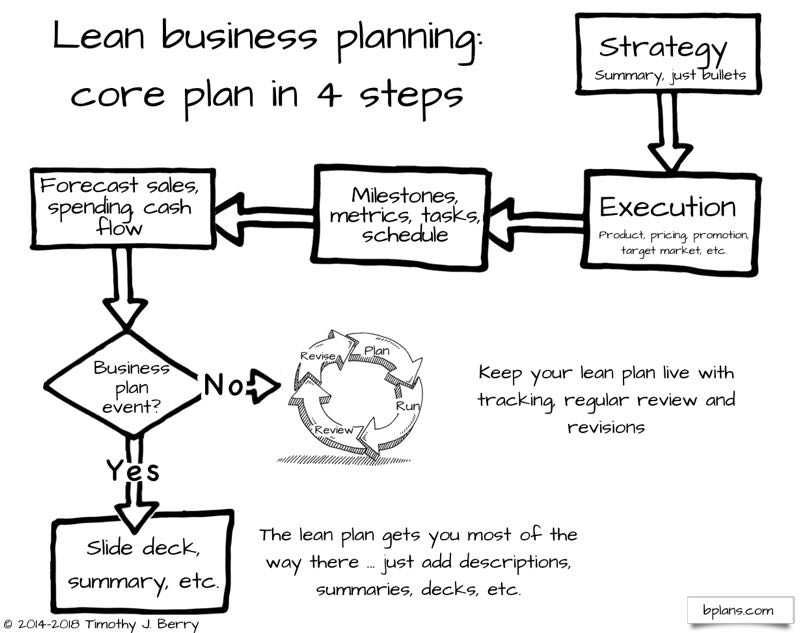There is some bad advice floating around in the startup world. Useful as the Lean Canvas is, and despite some well-intentioned suggestions of summaries, those are not business plans. They don’t deal with the drivers and components of cash flow. They don’t set milestones, metrics, and tracking. You can’t run a business with them. And you won’t get through investors’ due diligence with them.
Do those summaries, sure. Use those frameworks. But don’t think they replace business planning.
Beware of the straw-man logic that first defines a business plan as a huge ponderous document that takes months to prepare, and then advises against it. That’s very much like defining exercising as running 50 miles in a single day, then advising against it.
Real business plans are not long, not traditional, and definitely not a waste of time. Business owners need them. Startups need them. Angel investors want to see them during due diligence.
They set strategy and tactics concisely, they set milestones and performance metrics for tracking, they set priorities, and lay out the relationships between sales, costs, expenses, balance sheet and cash flow as essential projections. And they stay lean and they get reviewed and revised often, at least once a month.
The worst thing about supposed experts advising against business planning is that it does such a disservice to real people trying to figure out how to run their business better. The components of cash flow (sales, costs, expenses, assets, liabilities, capital, profits) are way easier to understand and manage when laid out in an organized way than when just kept in somebody’s head. And milestones, tracking, and metrics, the components of accountability, take writing down, reviewing and revising as necessary. That’s all called management.
The myth about people – investors especially – not reading business plans is just a myth. It’s a word game. Some investors and a lot of supposed experts feel cool saying they don’t read business plans, but ask them whether there should be well-defined strategy, tactics, milestones, metrics, and projected numbers. Ask them whether they want milestones met and priorities established. They’ll all say yes. But the myth makers have first misdefined business plans as long, traditional, and so forth.
I’m was in an angel investment group for several years. We wanted summaries first, then pitches. We didn’t read business plans until after we were really interested, and even then, we didn’t want those long traditional business plans. But we do want to see that core information, including financials, as part of due diligence. We’ve never read a business plan until after liking the summary and the pitch and meeting the founders; but we’ve never invested in a startup that didn’t have a business plan.
So how can you do a good business plan in a week? Do a lean plan.
- Set your strategy as a focus on how you’re different, what you’re offering, and who’s your market. Use bullet points. Use the lean canvas if you like, as Luca suggests, or those other summaries. Just write it down.
- Set tactics to execute strategy. Think of them as the key decisions that make up a marketing plan, product plan, and financial plan, but linked to your strategy, to make your strategy happen. Keep it to bullet points, as lean as possible.
- Set monthly review schedule, milestones, performance metrics, and other concrete specifics to track. List assumptions. Make sure task assignments are clear.
- Develop projected sales and direct costs monthly for 12 months, and annually for the following two years. Then do the same for spending and cash flow.

And then do it again and again. Review and revise monthly.

So do a business plan. Do a lean plan. Not just a summary.




Comments
Good reasoning over a cup of coffee in the office. When nourishing and good. And when you don’t have money even to open a company you have to be content with the idea and nothing more. When you try to talk with an investor, he ignores you. Go down from heaven to earth, look around and you will see that the world has become different, that it is changing in relation to you as well. You cannot measure all talented people with one measure. Someone can come up with, and someone can do, and someone can solve the problems of the first two and enter the market with the finished product.
Most startups or rather individuals looking for investor funding do not really appreciate the need for a good business plan. I have actually read some summaries and plans that leave you wondering how and why you should even consider investing in the business to start with. Nicely put Tim, hopefully they get to learn what it takes to secure investor funding. Great advice.